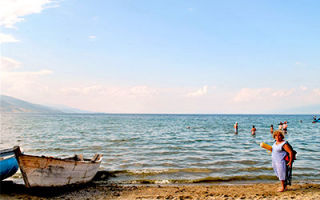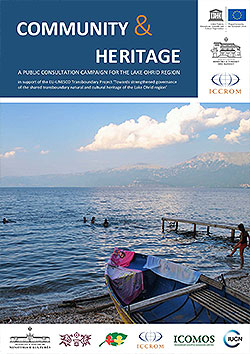The Lake Ohrid region is home to one of the world’s oldest lakes and is one of Europe’s most important biodiversity hotspots. The surrounding region is also significant for its cultural heritage within and linked to the natural setting. The area lying within the former Yugoslav Republic of Macedonia was inscribed as one of the first mixed World Heritage properties under the name ‘Natural and Cultural Heritage of the Ohrid region’ and in 2009 it was proposed that the property might be usefully extended to include the Albanian side, as this would significantly reinforce the integrity of the property and its values. This eventually translated into the joint EU-UNESCO Transboundary Project known as ‘Towards strengthened governance of the shared transboundary natural and cultural heritage of the Lake Ohrid region.’
The EU-UNESCO Transboundary Project, which was supported by ICCROM, ICOMOS and IUCN, has focussed on capacity building for future conservation and management. To support the final stages of this process an ICCROM team, working closely with local volunteers, developed a transboundary Consultation Campaign. The research carried out in 2018 sought insights from and about three key stakeholder groups: local community members, institutional representatives, and visitors. Greater emphasis was placed on the local community as the primary stakeholder in Lake Ohrid’s heritage. The Consultation Campaign was structured to capture insights that might inform ongoing management planning processes to benefit heritage and support wider sustainable development efforts.
The final report can be downloaded and summarizes the results of the Consultation Campaign, exploring issues related to sustainability of both the heritage and local development.
In conclusion, the Consultation Campaign was able to measure for the first time that there is a transboundary community which is complex and nuanced but which is united in its sense of connection to Lake Ohrid, its natural environment and its cultural heritage, and in its desire to work for that common cause. It was possible to demonstrate the community’s shared willingness to participate in the decision-making processes for the protection and management of the Lake Ohrid region. As the research took place in parallel to the late stages of the nomination process for the extension to the World Heritage property, it has been a unique moment for increasing the contribution of all stakeholders in a participatory sustainable development process, including future innovation in governance models. The results point to capacity in the Lake Ohrid region – among its local institutions, civil society and visitors – for transboundary mechanisms beyond the previous model of committees focused on central government participation.
Partners
UNESCO World Heritage Centre (project coordinator), European Union (main financial contributor), Ministry of Tourism and Environment of Republic of Albania (co-financer), Ministry of Culture of the Republic of Albania, Ministry of Culture of the FYR Macedonia, Ministry of Environment and Physical Planning of the FYR Macedonia, ICCROM, ICOMOS and IUCN.


